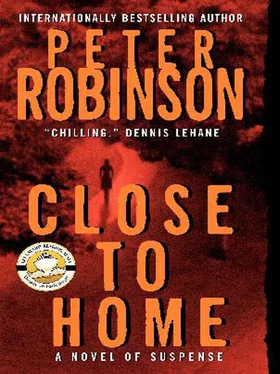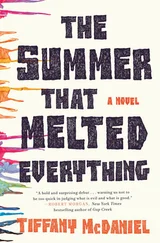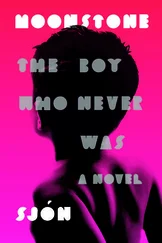As they walked through to the hall, Banks felt certain he caught a flurry of blond hair and long leg ducking through a doorway, but he could have been mistaken. Why would Rose Barlow want to listen in on their conversation, anyway?
The rain seemed to have settled in for the day after a short afternoon respite, a constant drizzle from a sky the color of dirty dishwater, when Annie did the rounds of Luke’s final ports of call. She found out nothing from the HMV staff, perhaps because they had such a high turnover and it was a large shop, hard to keep an eye on everyone. No one recognized the sketch. Besides, as one salesperson told her, many of the kids who shopped there looked pretty much the same. Black clothing wasn’t exactly unusual as far as HMV’s customers were concerned, nor was body-piercing or tattoos.
She fared little better at the computer shop on North Market Street. Gerald Kelly, the sole proprietor and staff member, remembered just about all his customers, but he had seen no one resembling the girl in black with Luke, who had always been alone on his visits to the shop.
Annie had just one last call. Norman’s Used Books was a dank, cramped space down a flight of stone steps under a bakery, one of several shops that seemed to be set right into the church walls in the market square. The books all smelled of mildew, but you could find the most obscure things sometimes. Annie herself had shopped there once or twice, looking for old art books, and had even found some decent prints among the boxes the owner kept at the back of the shop, though they were sometimes warped and discolored because of the damp.
The roof was so low and the small room so full of books – not only in cases against the walls, but piled up haphazardly on tables, ready to teeter over if you so much as breathed on them – that you had to stoop and make your way around the place very carefully. It must have been even harder for Luke, Annie thought, as he was taller and more gangly than her.
The owner himself, Norman Wells, was just a little over five feet, with thin brown hair, a bulbous sort of face and rheumy eyes. Because it was so cold and damp down there, no matter what the weather was like up above, he always wore a moth-eaten gray cardigan, woolly gloves with the fingers cut off and an old Leeds United scarf. He couldn’t make much of a living out of the little shop, Annie thought, though she doubted the overheads were very high. Even in the depths of winter a one-element electric fire was the only source of heat.
Norman Wells glanced up from the paperback he was reading and nodded in Annie’s direction. He seemed surprised when she showed her warrant card and spoke to him.
“I’ve seen you before, haven’t I?” he said, taking off his reading glasses, which hung on a piece of string around his neck.
“I’ve been here once or twice.”
“Thought so. I never forget a face. Art, isn’t it?”
“Pardon?”
“Your interest. Art.”
“Oh, yes.” Annie showed him a photograph of Luke. “Remember him?”
Wells looked alarmed. “Course I do. He’s the lad who disappeared, isn’t he? One of your lot was around the other day asking about him. I told him all I know.”
“I’m sure you did, Mr. Wells,” said Annie, “but things have changed. It’s a murder investigation now and we have to go over the ground afresh.”
“Murder? That lad?”
“I’m afraid so.”
“Bloody hell. I hadn’t heard. Who’d…? He wouldn’t say boo to a goose.”
“Did you know him well, then?”
“Well? No, I wouldn’t say that. But we talked.”
“What about?”
“Books. He knew a lot more than most kids his age. His reading level was way beyond that of his contemporaries.”
“How do you know?”
“I… Never mind.”
“Mr. Wells?”
“Let’s just say I used to be a teacher, that’s all. I know about these things, and that lad was bordering on genius.”
“I understand he bought two books from you on his last visit.”
“Yes, like I told the other copper. Crime and Punishment and Portrait of the Artist as a Young Man .”
“They sound a bit advanced, even for him.”
“Don’t you believe it,” Wells protested. “If I hadn’t thought him ready I wouldn’t have sold him them. He’d already been through T.S. Eliot’s The Waste Land, most of Camus and Dubliners . I didn’t think he was quite ready for Ulysses or Pound’s Cantos, but he could handle the Portrait, no problem.”
Annie, who had heard of these books but had read only the Eliot and a few of Joyce’s short stories at school, was impressed. So the books she had seen in Luke’s room weren’t just for show; he really did read and probably even understand them. At fifteen, she’d been reading historical sagas and sword and sorcery series, not literature with a capital L. That was reserved for school and was tedious in the extreme, thanks to Mr. Bolton, the English teacher, who made the stuff sound about as exciting as a wet Sunday in Cleethorpes.
“How often did Luke call by?” she asked.
“About once a month. Or whenever he was out of something to read.”
“He had the money. Why didn’t he go to Waterstone’s and buy them new?”
“Don’t ask me. We got chatting the first time he dropped in-”
“When was that?”
“Maybe eighteen months or so ago. Anyway, as I say, we got chatting and he came back.” He looked around at the stained ceilings, flaking plaster and tottering piles of books and smiled at Annie, showing crooked teeth. “I suppose there must have been something he liked about the place.”
“Must be the service,” Annie said.
Wells laughed. “I can tell you one thing. He liked those old Penguin Modern Classics. The old ones with the gray spines, not these modern pale-green things. Real paperbacks, not your trade size. And you can’t buy those at Waterstone’s. Same with the old Pan covers.”
Something moved in the back of the shop and a pile of books fell over. Annie thought she glimpsed a tabby cat slinking away into the deeper shadows.
Wells sighed. “Familiar’s gone and done it again.”
“Familiar?”
“My cat. No bookshop’s complete without a cat. After witch’s familiar . See?”
“I suppose so. Did Luke ever come in here with anyone else?”
“No.”
Annie took her copy of the artist’s impression out and set it on the table in front of him. “What about her?”
Wells leaned forward, put his glasses on again and examined the sketch. “It looks like her,” he said. “I told you I never forget a face.”
“But you told me Luke never came in with anyone else,” Annie said, feeling a tingle of excitement rise up her spine.
Wells looked at her. “Who said she was with him? No, she came in with another bloke, same sort of clothing and body-piercing.”
“Who are they?”
“I don’t know. They must have been a bit short of money, though.”
“Why do you say that?”
“Because they came in with an armful of brand-new books to sell. Stolen, I thought. Plain as day. Stolen books. I don’t have any truck with that sort of thing, so I sent them packing.”
Before he cut into Luke Armitage’s flesh, Dr. Glendenning made a thorough examination of the body’s exterior. Banks watched as the doctor examined and measured the head wound. Luke’s skin was white and showed some wrinkling from exposure to the water, and there was a slight discoloration around the neck.
“Back of the skull splintered into the cerebellum,” the doctor said.
“Enough to kill him?”
“At a guess.” Glendenning bent over and squinted at the wound. “And it would have bled quite a bit, if that’s any use.”
Читать дальше












